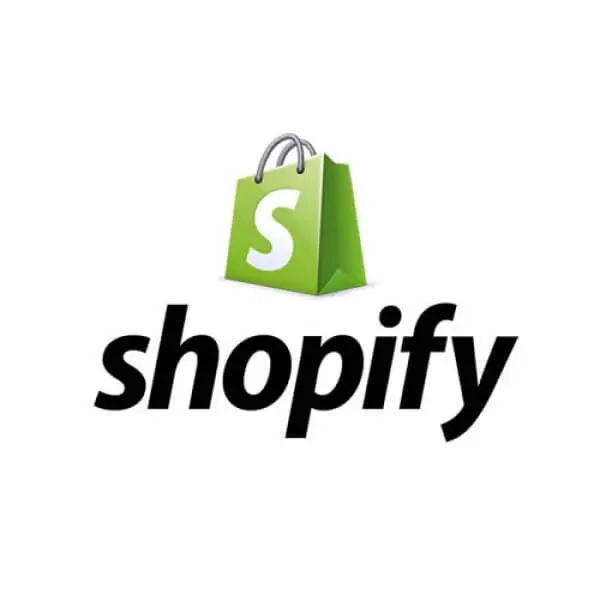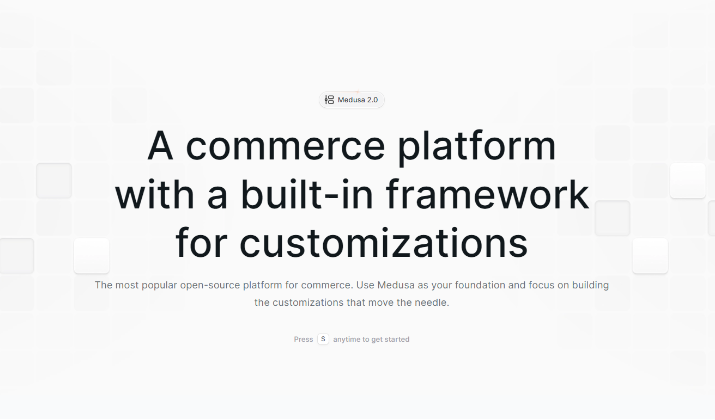In the ever-evolving world of ecommerce, the choice between a proprietary platform like Shopify and an open-source alternative like Medusa.js can be a pivotal decision for your business.
As open source ecommerce gains traction, this article aims to shed light on how Medusa.js, an innovative ecommerce platform, stacks up against the industry-leading Shopify.
But the real question is, which one is the best ecommerce solution for your needs?
Let’s find out.
Overview
Shopify
Shopify is a comprehensive ecommerce platform that provides businesses with the tools they need to set up and run their online stores. Here are some of Shopify’s key features:
- Free and paid themes from the Shopify Theme Store to make your store stand out and look great
- Free and paid apps from the Shopify App Store to expand the functionality of your store
- Shopify’s own payment provider to accept credit card payments
- A Shopify blog with guides and articles about running your store and connecting with customers
- A dedicated Support team available 24/7 to answer your questions
Overall, Shopify provides a robust platform with a wide range of features and customization options to help businesses succeed in the ecommerce space.
Also read: Gumroad vs Shopify vs Clickfunnels
Try Shopify free followed by first month at just $1. No credit card required. Limited Time Offer.
Medusa.js
Medusa.js is an open-source, headless ecommerce platform that allows developers to build custom ecommerce applications using modern technologies such as Node.js, React, and GraphQL.
It offers a highly customizable and flexible solution for businesses that require a high level of customization and integration with their existing systems. Key features of Medusa.js include:
- Modern Tech Stack: Medusa.js uses a modern tech stack including Node.js, React, and GraphQL. This may be more familiar to developers with experience in these technologies compared to Shopify’s proprietary codebase.
- Extensibility: Medusa.js is highly extensible, allowing developers to build custom features such as automating customer group assignments and integrating ChatGPT. It also allows extending its functionalities with new endpoints, business logic, database entities, and subscribers that listen to events and trigger specific actions.
- Storefront Options: It offers two storefront starters built with Next.js and Gatsby, respectively. Developers also have the freedom to create their own custom storefront using the Storefront REST APIs.
- Admin Dashboard: Medusa provides an admin dashboard that enables merchants to view, create, and modify data such as products and orders.
Overall, Medusa.js is a popular choice among developers who are familiar with Node.js and GraphQL and require a highly customizable ecommerce solution.
Its modern tech stack, microservices architecture, and headless approach make it a flexible ecommerce platform for building unique ecommerce experiences.
Check out: Shopify vs Shoplazza
Architecture: Monolithic vs Headless
When it comes to ecommerce platform architecture, there are two primary approaches: monolithic and headless.
Shopify, for example, has a monolithic architecture, where the ecommerce business logic is tightly integrated with the content management system (CMS) and frontend.
This approach simplifies hosting and maintenance, but can lead to slower loading times, more challenging graphic layer modifications, and potential conflicts between individual elements.
In contrast, platforms like Medusa.js take a headless architecture approach. This means the ecommerce functionality is decoupled from the presentation layer, allowing for greater flexibility and customization.
With a headless architecture, the backend, CMS, and frontend can be developed and scaled independently, giving developers more control over the ecommerce platform architecture.
This can result in faster loading times, easier graphic layer modifications, and reduced conflicts between different components of the system.
The choice between a monolithic or headless architecture for your ecommerce platform ultimately depends on your business needs and the level of customization and flexibility you require.
Monolithic platforms like Shopify may be a better fit for businesses with simpler requirements and a focus on ease of use, while headless architectures like Medusa.js offer more advanced customization and extensibility options for enterprises with complex or evolving needs.
Explore: Shopify vs Nopcommerce
Ease of Setup & Use
Shopify is known for its simplicity and ease of use, making it an attractive option for merchants with no-technical knowledge who want to quickly set up an ecommerce store.
Shopify provides a range of pre-built themes and an intuitive admin panel that allows users to manage their ecommerce platform setup and ecommerce platform usability without requiring extensive technical expertise.
In contrast, Medusa.js setup may require a slightly higher level of technical proficiency, as it is an open-source headless commerce platform.
However, Medusa’s abstraction-based architecture and strong developer documentation make it relatively straightforward for those familiar with the platform to customize and extend its functionality to suit their specific business needs.
Ultimately, the ease of setup and use will depend on your level of technical expertise and the specific requirements of your ecommerce business.
Shopify’s user-friendly approach may be the better choice for those new to ecommerce, while Medusa’s flexibility and customization options may appeal to more experienced developers and businesses with complex requirements.
Read this too: Wix vs Squarespace vs Shopify
Try Shopify free followed by first month at just $1. No credit card required. Limited Time Offer.
Customization
When it comes to customization, the differences between Shopify and Medusa.js become quite apparent.
Medusa.js offers extensive customization options, allowing developers complete control over the ecommerce platform, enabling unique user interfaces and tailored features to meet specific business needs.
Shopify, while customizable through themes and apps, has limitations compared to Medusa.js, especially for advanced customizations that may require working within Shopify’s framework. Due to Shopify’s monolithic architecture, developers are often limited in their ability to add custom functionalities or completely customize the storefront to meet unique business needs.
Shopify does offer a solution called Shopify Plus, which starts at $2,300 per month and allows developers to go “headless” through their Hydrogen setup.
This approach enables the development of custom storefronts, providing more flexibility. However, the high price point of Shopify Plus may not be feasible for all businesses, especially those in the early stages of growth.
In summary, Medusa.js stands out for its high level of customization, offering developers complete control over the ecommerce platform.
Also read: Ecwid vs WooCommerce
Developer Experience
When it comes to developer experience, Medusa.js shines. The platform is built with developers in mind, focusing on providing a great developer experience through its architecture, ease of setup, supporting community, and strong documentation.
Developers can customize and extend Medusa’s functionality with ease, thanks to its abstraction-based design and open-source nature.
The platform’s modular architecture allows you to easily integrate custom features and functionalities, without having to worry about the underlying complexities.
This level of customization and extensibility is often lacking in more traditional ecommerce platforms, like Shopify, which can limit your ability to create a truly unique and tailored ecommerce experience.
Furthermore, the Medusa.js community is highly engaged and supportive, providing valuable resources, tutorials, and assistance to help developers get up and running quickly.
The platform’s comprehensive documentation further enhances the developer experience, equipping you with the knowledge and tools needed to maximize Medusa’s capabilities.
In contrast, the Shopify developer experience may not be as seamless, as the platform’s monolithic architecture and proprietary nature can present more challenges when it comes to customization and extensibility.
While Shopify does offer a headless option, the Medusa.js approach of being built for developers from the ground up can provide a more streamlined and rewarding development experience.
Check out: Shopify vs Lazada
Try Shopify free followed by first month at just $1. No credit card required. Limited Time Offer.
Payment Integration Options
A significant distinction between Shopify and open-source platforms like Medusa.js is the ability to have full control over payment system integration.
Shopify’s proprietary approach often limits merchants to the payment options available within their ecosystem, which may not always align with your business needs or customer preferences.
On the other hand, Medusa.js allows you to integrate a wide range of payment gateways, including popular options like Stripe, PayPal, and Braintree.
This empowers you to offer your customers their preferred Shopify payment options and seamlessly integrate with your existing payment workflows.
With Medusa.js, you can tailor the Medusa.js payment integration to your specific business needs, whether it’s supporting multiple currencies, providing subscription-based billing, or implementing custom payment rules.
The level of control and flexibility can be particularly valuable as your business grows and evolves, allowing you to adapt your payment infrastructure to changing market demands.
Explore: Ecwid vs Adobe Commerce
Scalability & Growth Potential
As your ecommerce business grows, the platform you choose can have a significant impact on your ability to scale and expand.
Shopify
Shopify’s approach to simplifying store setup can come at a cost when it comes to ecommerce platform scalability and growth potential.
One of the key challenges with Shopify is its monolithic architecture, where the ecommerce business logic is tightly integrated with the content management system (CMS) and frontend.
This can make it more complicated to expand your market, add new integrations, and customize your store to meet your evolving needs.
Developers may find themselves building workarounds to achieve their business goals, potentially leading to technical debt and operational inefficiencies.
In contrast, the headless and abstraction-based architecture of Medusa.js offers greater ecommerce platform scalability and growth potential.
Try Shopify free followed by first month at just $1. No credit card required. Limited Time Offer.
Medusa.js
Medusa.js is designed to be highly extensible, allowing you to easily add new features, integrate with a wide range of third-party services, and customize your storefront to suit your unique business requirements.
The level of flexibility can be particularly valuable as your Shopify scalability needs evolve and you explore new opportunities for ecommerce platform growth potential.
When it comes to choosing an ecommerce platform that can support your long-term growth and expansion, the scalability and flexibility offered by Medusa.js may be a key advantage over the more rigid structures of Shopify.
By selecting a platform that can adapt and evolve alongside your business, you can position yourself for continued success in the dynamic ecommerce landscape.
Read this too: Shopify vs Instamojo
Apps & Integrations
Shopify
- Shopify has a large ecosystem of apps and integrations, with over 6,000 apps available in its app store.
- These apps cover a wide range of functionalities like marketing, sales, shipping, accounting, and more.
- Many of these apps are free or have free plans, but some require paid subscriptions.
- Shopify’s apps are designed to be user-friendly and easy to install and configure.
Medusa.js
- As an open-source platform, Medusa.js relies more on community-driven plugins and integrations.
- Medusa.js has official plugins for common ecommerce features like payments, shipping, and notifications.
- Developers can also build custom plugins to extend Medusa.js’ functionality or integrate with other systems.
- Integrating Medusa.js with other platforms and services is straightforward due to its headless architecture.
In summary, while Shopify has a larger and more polished app store, Medusa.js offers more flexibility for developers to build custom integrations and plugins to suit their specific needs.
The choice between the two depends on the specific requirements of the ecommerce business and the level of customization needed.
Also read: Ecwid Coupon Code
Shopify vs Medusa.js – Which is Better?
When comparing Shopify vs. Medusa.js, there is no definitive “better” platform, as the choice should be based on your current and future business needs.
Shopify is a great option for merchants with no-technical knowledge who want a quick and easy way to set up an ecommerce store, while Medusa is better suited for developers who require more customization and flexibility.
In other words, Shopify may be the better choice for merchants seeking a user-friendly, plug-and-play ecommerce solution, while Medusa.js is more suitable for businesses that prioritize flexibility, scalability, and advanced customization options.
















